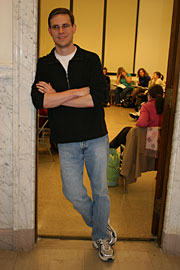The Road Back to Teaching
Septeber 10, 2008 - "Non-traditional" Students are the Norm in GSE / TFA Partnership
First-time teacher Wilson Boyd had an assignment in one of Philadelphia's most troubled high schools: Olney West, a place so marked by violence and academic failure that the district had hired an ex-Marine to restore order there. The challenges confronting Boyd -- kids with reading skills that lag far behind their grade level, kids with disengaged parents, kids who've given up on school -- are typical for urban schools like Olney West. Boyd, on the other hand, was something of an anomaly.
 A Teach For America corps member not long out of college, Boyd was also a master's student at Penn GSE. He was working hard to improve his students' reading skills, thinking that he'd be successful at his job if student achievement moved up an average of two grade levels.
A Teach For America corps member not long out of college, Boyd was also a master's student at Penn GSE. He was working hard to improve his students' reading skills, thinking that he'd be successful at his job if student achievement moved up an average of two grade levels.
One night every week, Boyd participated in an inquiry professional development seminar for TFA corps members offered through GSE's teacher ed master's program. The seminar was a piece of an unconventional partnership between GSE and TFA -- in summer 2005, Penn GSE had entered into an exclusive contract to provide in-service professional development to qualified members of TFA serving in the School District of Philadelphia.
"Now everybody who works for TFA in Philadelphia comes to Penn," says Dina Portnoy, director of the Penn GSE/TFA program. (Special ed students take courses conducted by Chestnut Hill College.) Modeled after other executive-education programs, the GSE/TFA partnership helps people like Wilson Boyd hone their teaching skills while working full time in the classroom. The curriculum includes two summer sessions, the weekly seminars, and monthly weekend methods courses that address core pedagogical skills.
TFA corps members like Wilson Boyd are recent college graduates who commit two years to teaching in low-income urban and rural public schools. The GSE / TFA aims to prepare first-rate teachers with the passion and knowledge to be lifelong advocates for educational equity, and Boyd exemplifies these objectives.
After completing his TFA commitment -- and earning his master's at Penn-he spent a year in St. Louis as a Coro Fellow in Public Affairs. "Coro is an experiential learning program that rotates through different sectors of the public arena," explains Boyd. He worked in health care, municipal government and agricultural technology but found himself increasingly drawn back to education. "When I left the classroom in Philadelphia, I did not think I would return to teaching. I thought I would do something political."
He had his chance to enter the public sector: as part of his Coro Fellowship work, he investigated Mississippi's recruitment and retention policies and was given the opportunity to continue as a consultant on education policy. But as he traveled around his home state -- to districts rich and poor, urban and rural -- he realized that education is where he wants to be: "I wanted to work with people who were having success teaching low-income students."
He found what he was looking for in the KIPP model, and today Boyd is teaching seventh- and eighth-grade science in the KIPP Academy Nashville, one of the network of college-prep schools where underserved students develop the skills they will need to succeed in high school, college, and beyond.
